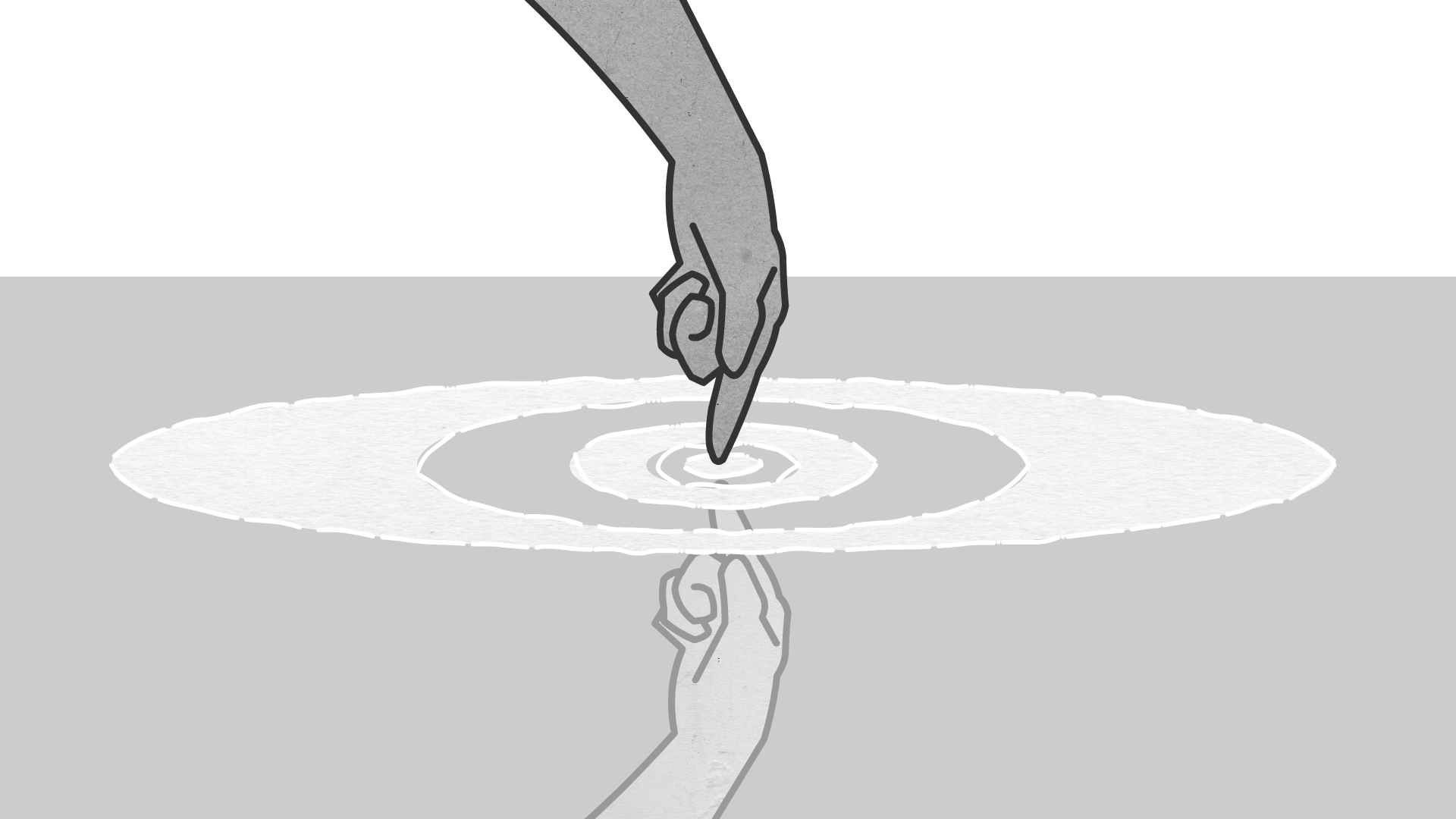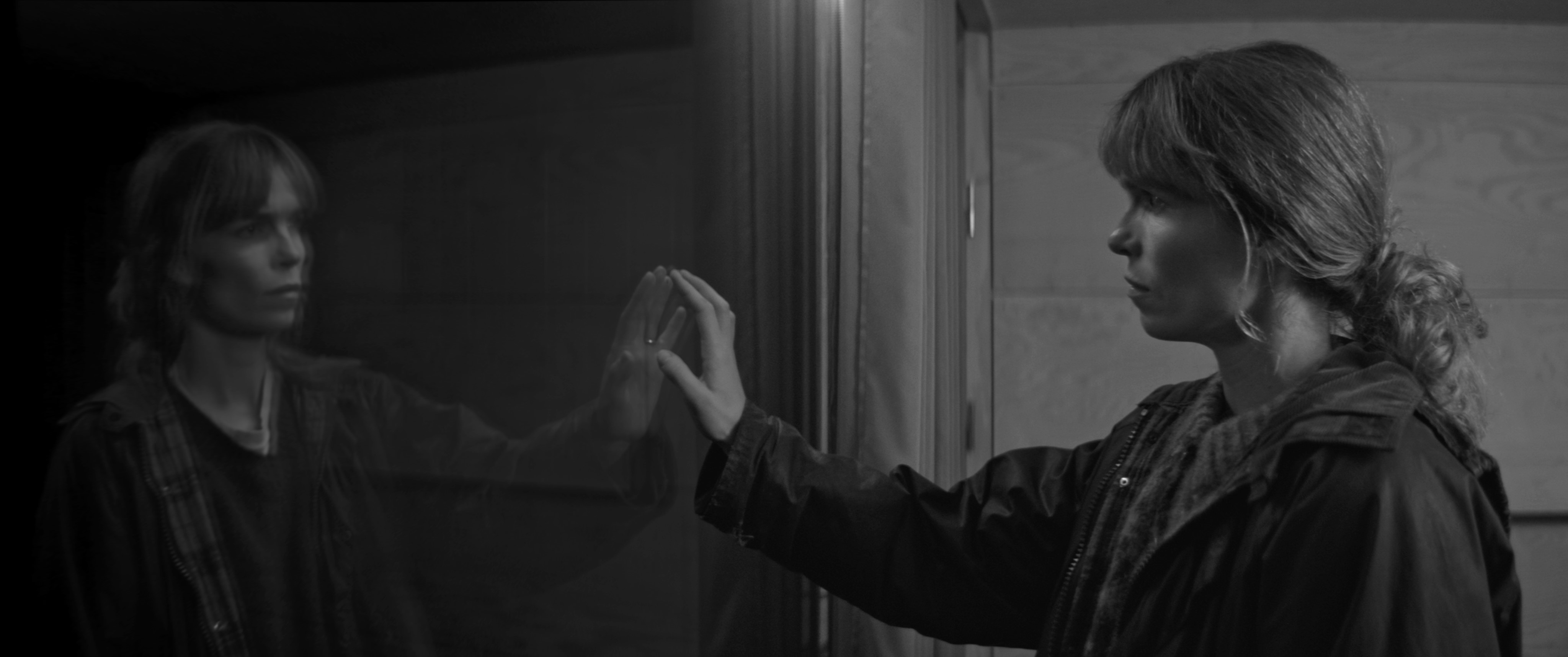Superposition + Interview with Director Karoline Lyngbye.
by Oliver Spicer.

What the couple meet in this Danish “Lo-Fi Sci-Fi” whilst trying to escape from modern living by living in a secluded cabin is much more frightening than the monsters from horror and even more existential than the aliens from science fiction… They meet near identical versions of themselves.
Mikkel Boe Følsgaard (Teit) and Marie Bach Hansen (Stine) play the two versions of a couple, who are as narcissistic as each other. Both are creatives - with Teit producing a talk podcast of the couple as they discuss their relationship and lives in near solitude, and Stine writing a novel. They want to repair their failing marriage and look after their young son called Nemo, but end up fighting amongst themselves and the other themselves. Drawing in vastly different ideas, from quantum physics to psychology and relationship counselling, the film has a deeply philosophical yet realistic tone.
I was lucky enough to speak with director Karoline Lyngbye about the film. With first section of our conversation was spent exploring the themes and inspirations behind
Part 1:
OLIVER
I first wanted to ask about the name,
KAROLINE
Yes, it definitely was. They mention it in the film as a possibility, but it's an idea: maybe it's superposition, maybe it isn't. But that's definitely where it came from.
OLIVER
Copenhagen and Denmark are very big on physics. Especially with Niels Bohr who was kind of philosophical and wrote poetry on it. Is it that kind of poetic form of physics?
KAROLINE
That's a beautiful way of saying it, yeah. I mean, I thought it was really interesting to take something as concrete as physics, quantum physics, and doing a sort of thought experiment on that.
“Opposites are not contradictory, but complimentary.”
- Neils Bohr
Quantum superposition is when something can be in multiple states at the same time, and when measured switches to a single state. When photons meet an obstacle, in theory they take every possible path around it - which can be thought of as the same kind of existing in two places at once phenomenon shown in the film. It's a refreshing take on the Sci-Fi genre which has been overcome with nonsense explinations from its origins.
OLIVER
And the location of a forest. Was that important in the initial script?
KAROLINE
It was one of the first kind of ideas: moving away from the chaotic life in the city and trying to find some peace in nature and yourself. And having difficulties doing that: letting go of the ego.
OLIVER
Well the characters are quite unlikable, quite ego-centric.
KAROLINE
That's the whole theme I think. That's their characteristics and I feel like that's one of the strongest characteristics of modern day people in relationships is that we're ego-centric and we're so focused on ourselves and our own needs all of the time. It was important they were both like that, but obviously that makes them not very likeable. Hopefully, you can recognise something but they're not especially likeable. On the other hand, you have to want to follow them all the way through as an audience and not dislike them too much.
OLIVER
There's also an aspect of content creation in the form of their podcast, what inspired you to add that into the film?
KAROLINE
Well I came up with the initial idea of this off-grid moving and how to lose your ego in modern day life. And I approached the screenwriter Mikkel [Mikkel Bak Sørensen], with that idea, and then coming up with the doppelgänger idea was like a collaboration. We were thinking of what was the worst thing they could meet out there and what's the thing that would challenge their ego the most... and that's obviously themselves.
OLIVER
With the woods, and meeting something strange - is there a folk law aspect to it?
KAROLINE
I mean not really. We don't say that it's definitely quantum physics phenomena but it is a very simple idea: to take something that's not folk law into the forest, it's the idea there's something very natural and very unnatural meeting. Like the humans from the city come with all that shit and they also come with something unnatural in a way.
OLIVER
Yeah, they bring all their technology.
KAROLINE
Exactly. They ruin their own chance of being in contact for what they actually came for because they bring all their shit: their personal shit but also their technology shit.
OLIVER
And in the film there's a lot of visual metaphors for doubles: mirrors and the lake it starts with. Did you add that into the script or later?
KAROLINE
The lake in the beginning was in the script. We liked that idea of something that is a natural thing, but when you look at it from a different perspective it's weird. It's like: What am I looking at? It kind of looks like something from outer space when you turn just a few degrees - and that's an interesting metaphor for the entire film: when you just turn your perspective a little bit, you see things very differently.
OLIVER
Where did the inspiration behind the doppelganger aspect come in?
KAROLINE
Meeting yourself is actually the worst thing that can happen for these people. It was more from this psychological kind-of place and then developed into Sci-Fi. It was kind of an uncanny thriller-drama that developed in the process of writing into a Sci-Fi premise, but it's a very Lo-Fi Sci-Fi. It didn't start as an "I want to do a doppelganger film".
OLIVER
There's lots of comments about psychology, it's very much about their relationship and their inner thoughts. Did that come from an inner place: is there something about psychology that specifically interests you?
KAROLINE
Very much, it's something I've always been interested in. It's a hobby, always talking about other people's relationships and god knows what and I feel like that's a lot of modern day people's hobby in the city and my age group and stuff. It was very inspired by what I know myself, but I thought it was interesting and fun these characters talk so much about themselves and talk so much about their relationships but it doesn't help them really because they're not stepping out of their ego. Talking a lot.
OLIVER
The kind of content their trying to create goes a bit wrong and there's stuff about them maybe not being truthful, and I was wondering whether that's a reflection of cinema maybe - trying to truthfully portray something?
KAROLINE
Yeah, in a sense. It's all about perspective and you can show something in a film and twist it in a little way, and then it looks completely different. So - yes. He also has a product, as the film is, and has a perspective in his podcast that he can control but then she tries to control it in a different way and she doesn't like letting go.
OLIVER
So is control and loss of control important in the film?
KAROLINE
I think so. I feel like none of the characters trust each other, so they're fighting about control. And when they meet the other couple, they fight about control. Then, they switch sides. But everyone is fighting for themselves all the time - which is really rough you know. And I don't even know if they need to fight but they fight each other all the time inside.
Part 2:

A mirrorless reflection from Superposition - provided by EIFF, converted into monotone.
Towards the end of our conversation I asked Karoline Lyngbye about her first steps into film...
KAROLINE
In Denmark we have the National Danish Film School, and it accepts six directing students every second year. So I applied three times before I started, and did a lot of short films before that. It took quite some time to do the first feature, I was working on several themes that I developed but didn't go the whole way through. In Denmark we very much don't have that much private funding in films because it's such a small country, it's very much government funded the first film you do - but obviously it's quite hard to do that first film. But you have much more private funding.
OLIVER
Yeah, like the BFI.
KAROLINE
But the BFI is not private is it? Or is it?
OLIVER
I think the BFI is private, but uses like national lottery money.
KAROLINE
Yes. I saw that last night in that opening film and wondered what that was?
OLIVER
Oh it's like the lottery.
KAROLINE
It is the lottery!
OLIVER
Yeah, I guess they donate some money to the BFI?
KAROLINE
Oh funny, yeah.
OLIVER
But like, with the government you can have like tax breaks on film production and stuff like that. And the film is set in Sweden right? Was there anything like that?
KAROLINE
We did actually try to get some Swedish funding. We got a little bit, we wanted more. And it's a Finnish co-production.
OLIVER
Oh Right.
KAROLINE
My producer worked with the Finnish Film Institute before so all the post-production, sound, VFX is Finnish. So yeah that was a really nice collaboration... It was done in this open call in the Danish Film Institution for first time directors where you apply with the first idea. In Denmark, the whole process is very script orientated. But this was just based off the idea you give. The money is okay to do a maybe twelve minute version, three scenes or something. We actually found the location, and the male actor is the same. You know, so you did a lot of work and we got a distributor off of that because people could see the proof of concept. It was a nice process to develop characters and the visual side of it along with the script. Especially with the doppelgänger think, they wanted to see a proof of concept that would actually work without a huge VFX budget.
OLIVER
And was there anything between the proof of concept and the final film that was tweaked?
KAROLINE
Yes. We did like three scenes: the opening scene that's similar to the one in the film, the scene where the kid is weird which is almost exactly the same, and we did the scene where they meet in the reflection. So it was like the scenes you thought would be great, but we didn't have the script or story at all so it's so interesting that it was so close to what we ended up with. We didn't have the story, didn't have the ending at all - we didn't really know where we were going. But we knew from early on that we would get the whole film funded, and that's not common right? Usually you struggle all the way with a lot of different scripts before you get the final funding so it was really a luxury to be able to relax and play with it.
The fear utilised in Superposition is a very unique and indescribable one. Seeing an alternate version of yourself would bring a flood of emotions about consciousness and identity. It's strange also because we are already used to seeing versions of ourselves in mirrors and pictures, which stirs up none of the eerie emotions evoked in the film. If we were to meet someone who only looks near identical to ourselves it may evoke a portion of the fear, but there's a certain uncanny aspect to it where the closer their body approaches our own the more unsettling it becomes. Until it becomes yourself, which you can understand through reflections. In many ways the theme of the film is similar to
by Oliver Spicer, August 2023.